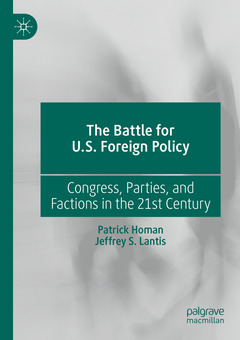Description
The Battle for U.S. Foreign Policy, 1st ed. 2020
Congress, Parties, and Factions in the 21st Century
Authors: Homan Patrick, Lantis Jeffrey S.
Language: English
Subject for The Battle for U.S. Foreign Policy:
Keywords
congress; factions; polarization; partisanship; factionalism; Progressive Caucus; Tea Party; Freedom Caucus; solvency debate; democratic representation; Obama; activism; Trans-Pacific Partnership; Trump; Iran nuclear deal; DACA; minority influence; foreign policy; immigration reform; us politics
Approximative price 63.29 €
In Print (Delivery period: 15 days).
Add to cartPublication date: 12-2020
258 p. · 14.8x21 cm · Paperback
Approximative price 89.66 €
In Print (Delivery period: 15 days).
Add to cartPublication date: 12-2019
258 p. · 14.8x21 cm · Hardback
Description
/li>Contents
/li>Biography
/li>Comment
/li>
This book is an original study of the contemporary debate over U.S. foreign policy between the president, members of Congress, and political parties. Specifically, it examines how factions at the ideological extremes within parties such as the Tea Party, the Freedom Caucus, and Progressive Democrats can play significant roles in shaping U.S. foreign policy. In today?s polarized atmosphere where Americans seem increasingly divided, factions are emerging as powerful insurgents, innovators, and engines of change. The book develops a minority theory of influence that recognizes the importance of traditional and nontraditional strategies including persuasion, legislation, and issue framing. Original case studies explore factions at work in foreign policy development during the Barack Obama and Donald Trump administrations, including struggles over immigration policy, trade agreements, development aid, and foreign policies toward Iran and Syria. The Battle for U.S. Foreign Policy captures the spirit of ideological and practical party struggles and fills a substantial gap in foreign policy analysis literature.
Patrick Homan is Associate Professor of Political Science at Dominican University, USA
Jeffrey Lantis is Professor of Political Science and Chair of the Global & International Studies Program at The College of Wooster, USA
Weaves theoretical perspectives together to advance a new model of factionalism in the battle for foreign policy
Examine the origins of the Tea Party/Freedom Caucus and Progressive Democrats, as well as their primary motivations, choices of strategies, and the circumstances in which they are more likely to succeed
Addresses Trump’s ascendancy to the national political stage and the rise of populism as an extension of these ideological struggles
These books may interest you

Legislating Foreign Policy 160.25 €



